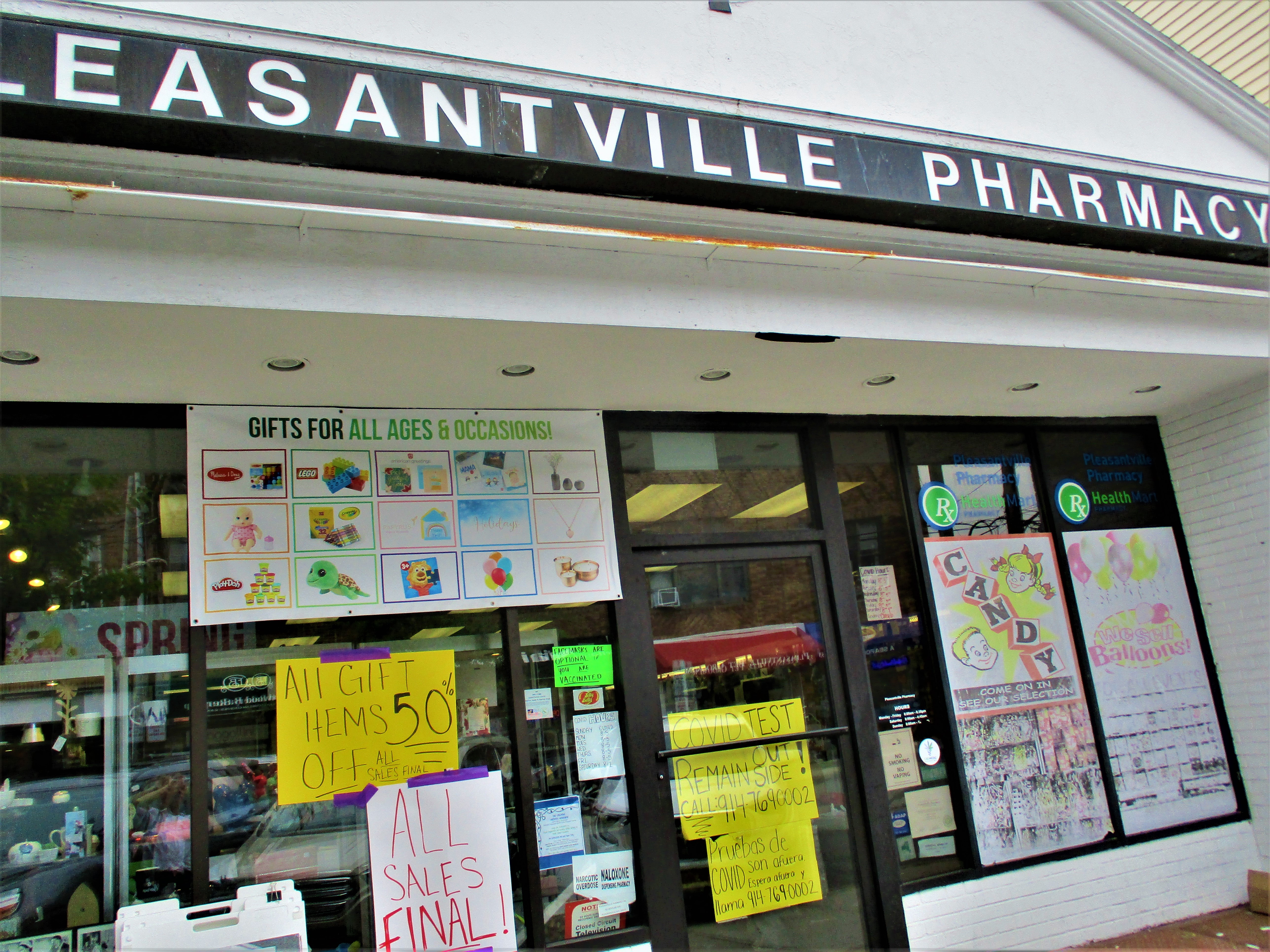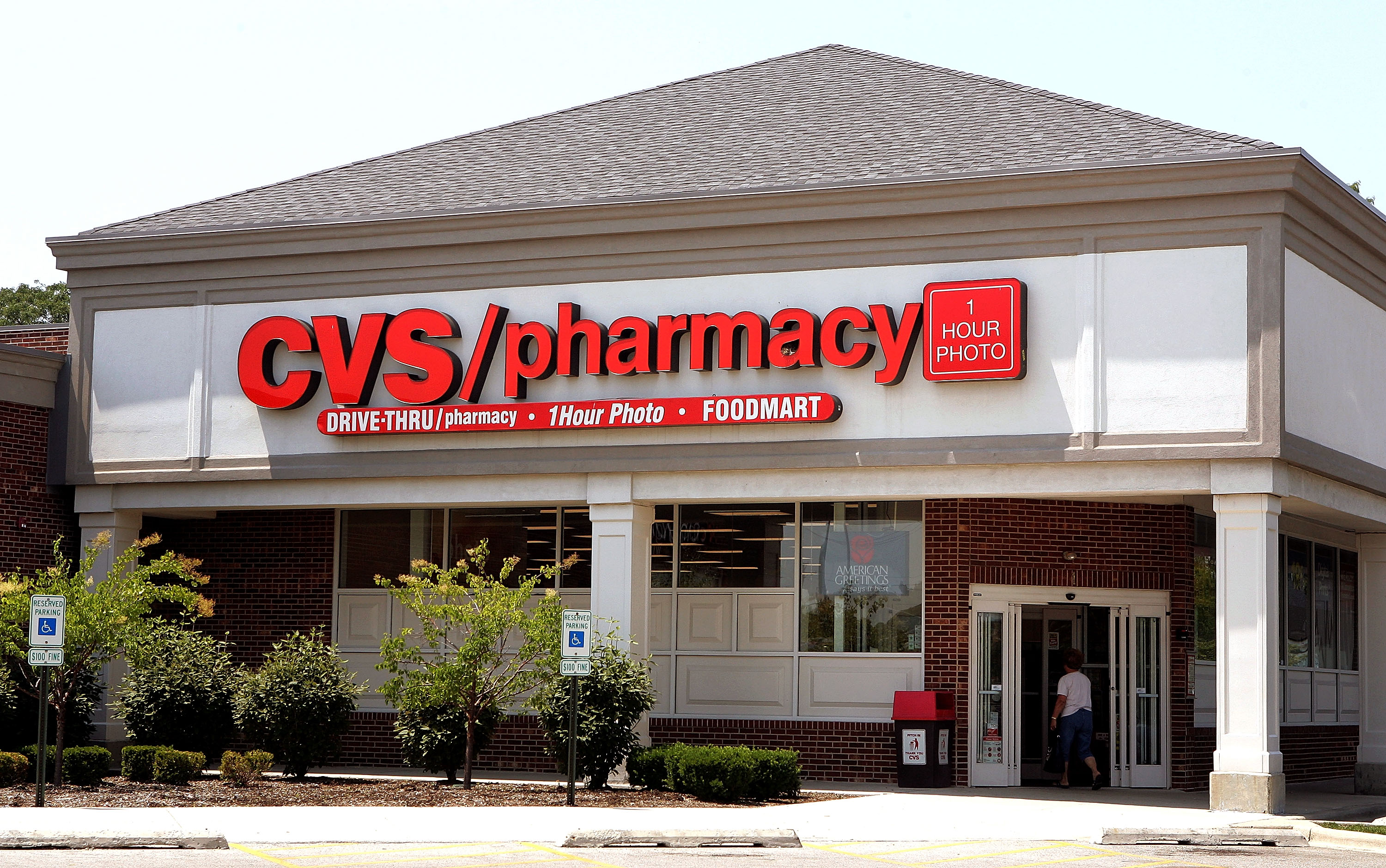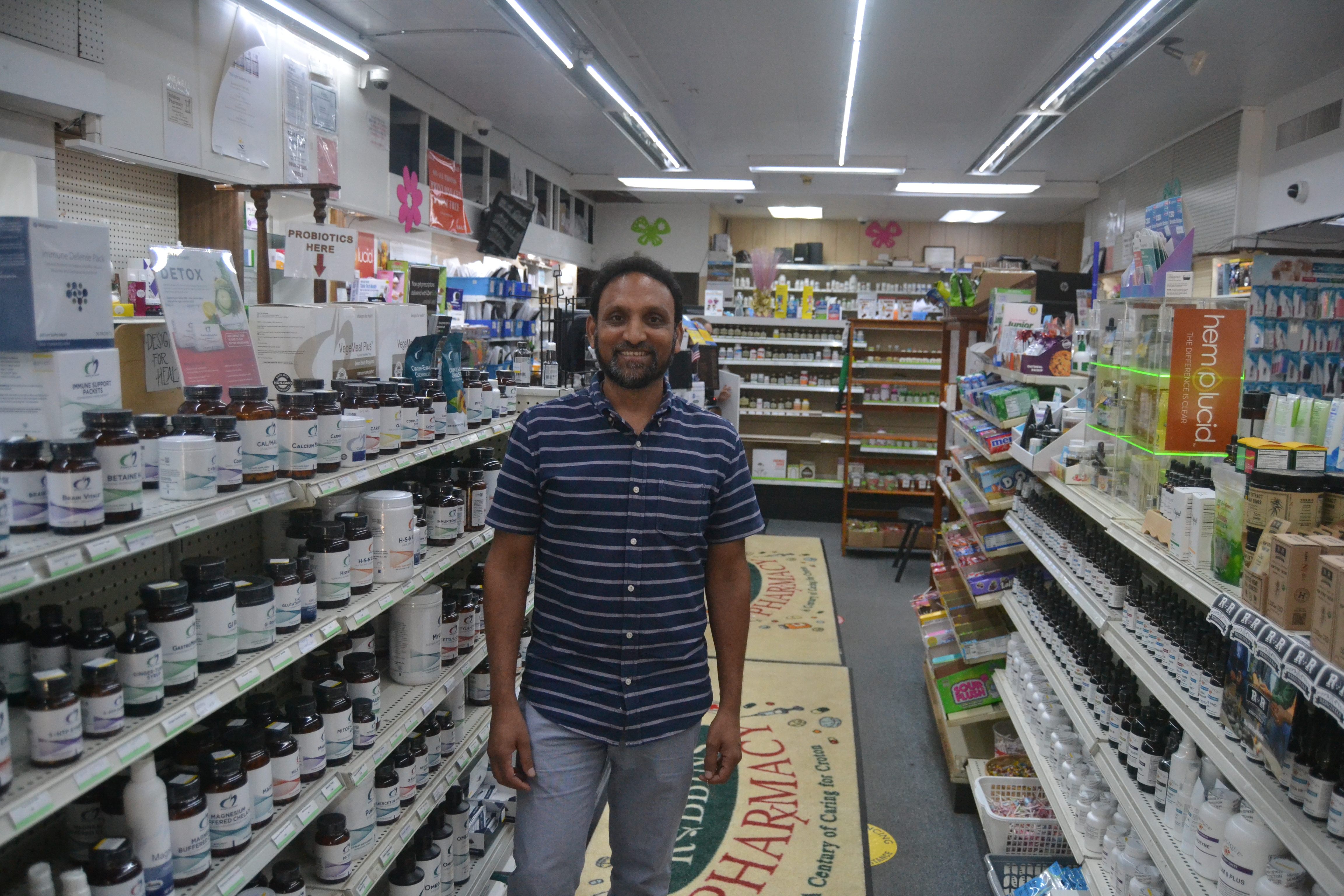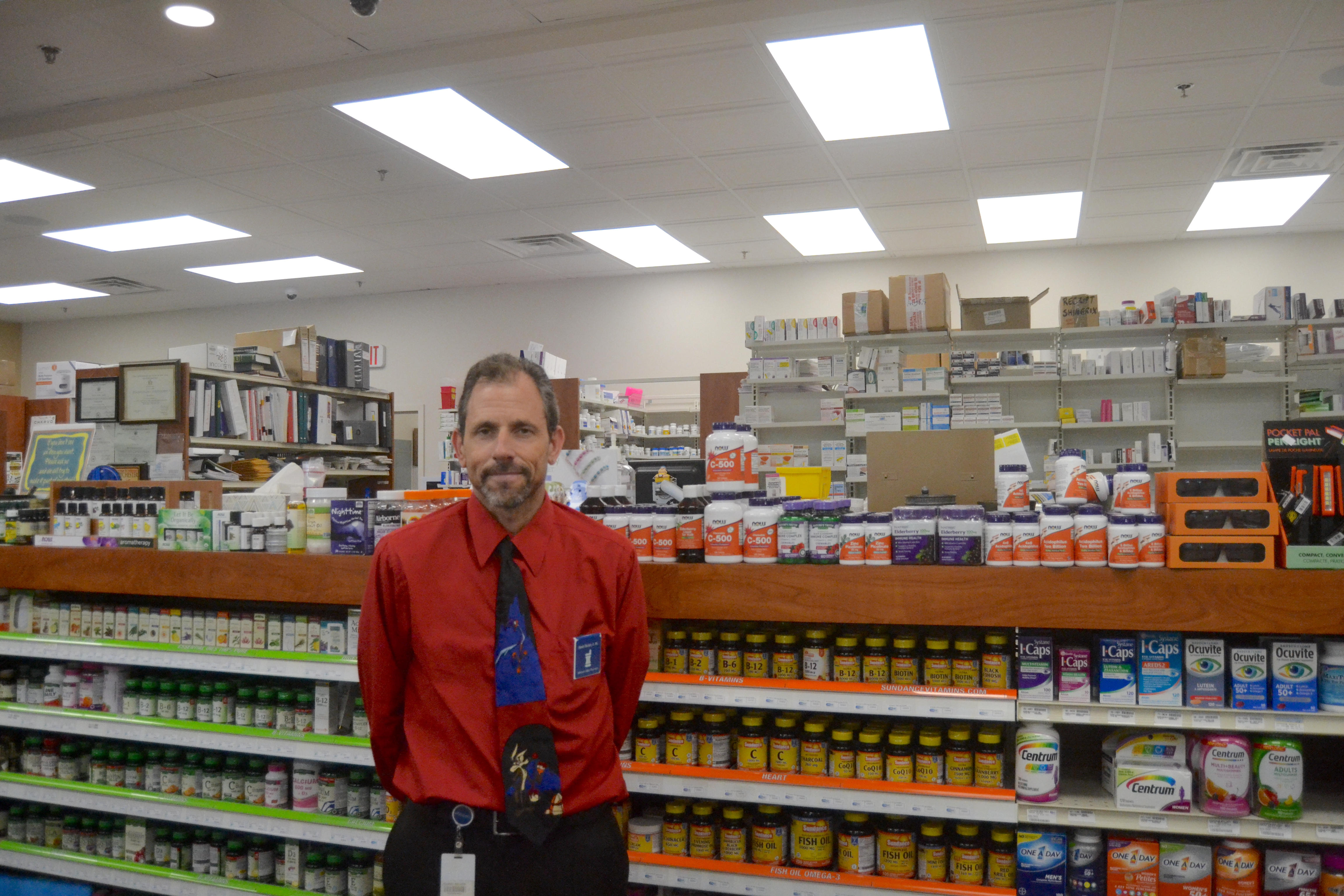Our Vanishing Corner Drugstores
News Based on facts, either observed and verified directly by the reporter, or reported and verified from knowledgeable sources.
Independent pharmacies struggle to survive against the big chains and those who control the pricing of prescription medicine.

Good morning! Today is Tuesday, October 12, and you are reading today’s section of Examiner+, a digital newsmagazine serving Westchester, Putnam, and the surrounding Hudson Valley.
Need to subscribe — or upgrade your Examiner+ subscription? Details here.

The storefront of the now-defunct Pleasantville Pharmacy is seen on its last day of operation in August 2021, after serving the village for more than a hundred years.
You’ve heard this story before. The mom-and-pop pharmacy that’s been down the block for decades, whose friendly and knowledgeable pharmacist knows every medication you ever needed, is suddenly going out of business. The community is jolted, years of trust and unique patient/pharmacist relationships — gone. How did this happen?
Cash flow in the healthcare empire is like a swift creeping vine with multiple tentacles reaching for revenue any time money is exchanged between drug manufacturers and insurance plans, doctors and patients, or patients and drugstores. The vines have grown into a huge, dark jungle where shadowy profits are made hand over fist without any accountability.
THE SQUEEZE FROM THE MIDDLEMEN
The hands dipping into the till of this $21 billion industry are those of middlemen known as Pharmacy Benefit Managers or PBMs who outwardly serve as go-betweens for health insurers and drug makers aimed at lowering drug prices. But the real goal of these for-profit middlemen is to have complete control over prescription drug prices that benefit some 266 million Americans while undercutting independent pharmacists seen as competition to the ubiquitous big-chain drugstores.
If you look at your prescription card, you’ll see the name of the three controlling PBMs: Caremark, OptimumRx, or ExpressScripts. Also listed is your health insurance plan which might be Medicare Part D, or a government or employee plan. The PBMs act as middlemen and negotiate the distribution of prescription drugs by controlling the money flow between the big pharmacy companies and the public. These three companies control approximately 90% of the medical drug distribution in our country.
When filling a prescription, your cost is calculated by the PBMs, who want a sizeable rebate from the drug manufacturer — usually around 50-60% of the drug price. PBMs can overcharge insurance companies and underpay pharmacist reimbursement fees. Known as spread pricing, the difference between each of these costs goes into the PBM’s pocket. We’re talking billions of dollars a year. And the hardships fall to our neighborhood drugstore.
When PBMs first came on the scene, everyone thought having a company manage drug prices to keep the cost down was a good idea. “Forty years ago, every pharmacist thought it was great when insurance companies came in and said we had to sign a contract with PBMs agreeing to fill all prescriptions at the average wholesale price,” said Michael Altman, former owner of Greenleaf Pharmacy in Hastings-on-Hudson.
Altman eventually sold Greenleaf after ten years and is now the owner and supervising pharmacist of Blend Labs Rx, a veterinary medicine lab in Queens. He recalled a time when independent pharmacies realized a profit, but then it all changed. “When the PBM contract was up for renewal they lowered our profit margin to 17 percent and said take it or leave it.”
Pharmacists choosing not to work with PBMs would see their supply of meds dramatically dwindle and risked losing their business. “New drugs are $70 a pill and you’re making $5 on it. At the end of the day you’re spinning your dollars,” said Altman. Pharmacies even reported that PBMs forced them to take a loss on prescription drug sales.

The relationship between PBMs and large pharmacy chains like CVS has been a prescription for disaster for independent drugstores struggling to compete.
Steering customers away from independent pharmacies and towards PBM-affiliated pharmacies such as CVS, Walgreens, or RiteAid is done by offering medications at half the price at their big chain drugstores compared to prices charged by local pharmacies. Snagging away small drugstore patients is also done by mandating that medicines and supplies be only available by mail-order, specialty pharmacies, or Medicare-approved supply companies.
To date, the former drugstore on Wheeler Avenue remains empty. Acknowledged as a common practice is when big chain drugstores such as Walgreens buy out smaller drugstores, they usually rent the space for about a year and keep it empty to insure no other drugstore opens at that location.
“I was forced to order my diabetes medicine and supplies by mail-order,” said Marcia Stone, a Shrub Oak resident. “When I was first diagnosed, my insurance covered a certain amount for supplies I needed. But when I went to refill, I could only do it through a specific company approved by Medicare.”
Stone ended up buying all new equipment made by an accepted brand. “It was a waste of money and there was obviously a financial agreement between the company who made the equipment and Medicare.”
LOSING THE WAR OF INDEPENDENCE
Stone is all too familiar with the world of independent pharmacies. Her grandmother was one of the first women pharmacists to open a store in the Bronx in the early 1900s and her father and uncle opened a drugstore in Long Beach, Long Island, and another in Larchmont called Hughes Pharmacy. “Eventually, in the late 1990s, the competition from the big chains closed down all the independent pharmacies. That was compounded by insurance contracts that lowered the reimbursement rate,” Stone recalled. “My father would get about $1.50 above the cost of the prescription. It was another death blow to independent pharmacies.”
When the Pleasantville Pharmacy suddenly shuttered in August after being a village mainstay for a hundred years, many customers said they felt like owners Salvatore Dileo and Ira Schwartz seemed to have disappeared, even though they agreed to be interviewed by the local public access TV station PCTV. All patient records owned by the Pleasantville Pharmacy were automatically transferred to Walgreens. Patients refusing to buy their medicine from Walgreens had to ask their doctor to switch to a drugstore of their choice since Walgreens did not cooperate with small pharmacies requesting the records.
To date, the former drugstore on Wheeler Avenue remains empty. Acknowledged as a common practice is when big chain drugstores such as Walgreens buy out smaller drugstores, they usually rent the space for about a year and keep it empty to insure no other drugstore opens at that location.
A handful of Pleasantville residents who didn’t want to buy their medications from Walgreens contacted Robbins Pharmacy in Croton-on-Hudson, while others have gone to more local pharmacies. The owner, Praveen Vuppala, purchased Robbins three years ago. He worked there for three months before he bought it and became familiar with the competition of larger chain drugstores nearby. But since Robbins Pharmacy has been a village landmark in the community since 1929, Vuppala saw great potential. To counteract the drastically low PBM reimbursement fees for prescriptions, which are 60% of his business, Vuppala expanded his products to include high-end vitamins and supplements, toys, and tailored school kits for elementary students in Croton and Yorktown. “We were able to pay our bills to stay afloat and we want people to come in and see what we carry,” Vuppala said. “Even though we don’t make money on the school kits, the word goes out and they come in.”

Owner Praveen Vuppala inside his Robbins Pharmacy in Croton-on-Hudson.
FORCED INTO SILENCE
The contractual agreements between pharmacies and PBMs are also known to include “gag clauses” which prohibit pharmacists from disclosing their low reimbursement fees. If a pharmacist refuses to sign, PBMs have been known to cut them off, knowing the small drugstore would lose business and be unable to survive.
“A gag order means I can never speak to the insurance company or the drug manufacturer about my contract with the PBM,” explained Rye resident Roger Paganelli, a third-generation pharmacist and owner of Mt. Carmel Pharmacy in the Bronx. “There is a veil of secrecy which gives PBMs a competitive advantage.”
According to Paganelli, when a drugstore chain like Walgreens buys patient records from small independent pharmacies, a contractual non-disclosure clause prohibits former owners from discussing any details of the transaction. For Michael Altman, his contract with the new Greenleaf owner stipulated that he couldn’t open another pharmacy for seven years within 50 miles of Greenleaf in Hastings-on-Hudson.
Other contractual non-disclosure clauses between pharmacy owners and PBMs have a chilling effect; some prohibit owners from talking to the press. The Robert Jacobson Surgical Pharmacy, a multigenerational family-owned pharmacy that opened over a hundred years ago in Yonkers and then in Mount Kisco in 1981 was recently sold to Abe Gurgis, who was reluctant to be interviewed for this story.
The threat PBMs pose to small independent pharmacies is greatly minimized by the corporate health industry and seen instead as a boost to fair pricing and a way to keep drug prices down. “We are incentivizing the rest of the [medical] supply chain to negotiate lower prices that are better for everyone,” said Leanne Gassaway, CVS Health vice president for state government affairs. “With our reimbursement rates to pharmacists, we are able to pay a competitive rate in a volatile commodities market that is actively changing every single day. We’re pushing the price down and we take that role very seriously.” However, many see this as an attempt to monopolize the prescription drug industry and bring in billions a year to the companies that own PBMs.
Another claw-back waged by PBMs is a retroactive charge known as DIR or Direct and Indirect Remuneration fees. DIR fees are based on confusing and often dubious pharmacy performance standards allowing PBMs to take back portions of their reimbursement fees and charge pharmacists many months after they’ve already received a low reimbursed fee for selling a drug. DIRs make it impossible for a pharmacist to know whether or not reimbursement of a claim will fully cover their costs for a drug. “They give star ratings to pharmacists,” said Jefferson Valley Pharmacy owner and pharmacist Dan Becker who also owns Putnam Valley Pharmacy. “The higher your star rating is, the less the fees. An average pharmacist pays $81K a year in DIR fees.”

Jefferson Valley Pharmacy owner and pharmacist Dan Becker, who also owns Putnam Valley Pharmacy.
Becker has been a pharmacist for 18 years and about 90% of his business is filling prescriptions. For him, escalating PBM and DIR fees are troubling. “We are still able to do business but it gets tougher and tougher.”
PROTECTING THE LITTLE GUY
Anthony Ciarletta owns the Westchester Pharmacy Group, which includes Grassy Sprain Pharmacy in Tuckahoe, Larchmont Pharmacy, Le-Mac Pharmacy in Yonkers, Trotta’s Pharmacy in Harrison, Taconic Pharmacy in Jefferson Valley, and GSP Long Term Care in Yonkers. He is part of McKesson Pharmaceuticals, a Pharmacy Services Administrative Organization (PSAO) which is a network of 3,500 pharmacies. Its strength in numbers bolsters the purchasing power to lower drug costs to independent pharmacies.
Like every other independent pharmacist, Ciarletta’s stores have beefed up their services to attract more customers by offering seven-day free home delivery of medications, longer hours, and online ordering. “We also monitor certain patients with diabetes and high cholesterol,” Ciarletta explained. “We send reminders and call to tell them when to take their meds. We also offer a co-mingled blister drug pack that could have ten different medications, each one labeled the time and day the med has to be taken.”
As mom-and-pop pharmacies become increasingly more competitive, the powerful Fortune-500 health companies up the ante by repeatedly lowering prices at the big chain drugstores while cleverly evading regulations that force them to operate with transparency. This is why many independent pharmacists feel that real change has to come with new, tougher federal and state laws. Pharmacy advocacy groups across the country and here in New York have demanded government step in. The Pharmacists Society of the State of New York (PSSNY) and its national counterpart, Pharmacists United for Truth and Transparency (PUTT), are among those pressing for new laws.
And the pandemic has emboldened that call. The blow dealt to small independent pharmacies during the COVID-19 outbreak was alarming. More than 300 independent pharmacies surveyed by PSSNY in March 2021, found 98% of pharmacies had their reimbursements further cut during the pandemic, and 97% feared laying off employees or having to reduce store hours or close as a result of those cuts.
The Pharmacy Rescue package was passed unanimously in June by the New York State Legislature but was never signed by then-Governor Andrew Cuomo. Some attribute Cuomo’s failure to sign the bills to pressure from powerful opposing lobbyists. This package of bills, if signed into law by Governor Kathy Hochul, promises to protect independent pharmacists from PBMs.
The legislative package, initially introduced by New York State Senator James Skoufis (D-39) of Orange County, parts of southern Ulster, and northern Rockland counties, is considered to be the most aggressive, comprehensive PBM set of accountability laws in the country. They require PBMs to be licensed by the state and to publicly disclose the specifics of spread pricing which, to this day, remain unknown.
Urging Hochul to sign the bills is Senator Pete Harckham (D-40). “Over the years, independent pharmacies have stood as integral parts of our communities that supported the vitality of Main Street,” he said. “The recent closing of the pharmacy in Pleasantville, however, underscores the necessity of the Pharmacy Rescue Package which will provide much-needed relief in different areas to these important small businesses, and I am optimistic that Governor Hochul will sign the package soon.”
CVS Health vice president Leanne Gassaway said if Hochul signs the Pharmacy Rescue package into law, “we will examine the PBM regulations on payments and make every effort to comply with the law. We will do our best to continue to be able to serve our customers.”
Jefferson Valley Pharmacy owner Dan Becker is hopeful but has reservations on the efficacy of new laws geared towards transparency by health corporations and PBMs. “For every law that is passed, there’s always a way out the back. Unfortunately, every time lawmakers try to implement legislation, it has the teeth taken out and the new law doesn’t have as much bite to it.”
Abby Luby is a writer and journalist living in the Hudson Valley. She currently writes for The Examiner and has written for The New York Daily News, SolveClimateNews, The Villager, The Real Deal, and the Record Review (www.abbyluby.com). Her feature writing on food and on the arts has been published in Hook Magazine, Valley Table Magazine, Edible Hudson Valley, Roll Magazine, Living@HomeCT, the Poughkeepsie Journal, The Stamford Advocate/Greenwich Time. Luby began writing creative non-fiction and poetry eight years ago. Her published short stories appear in the literary journals Parhelion and Persimmon Tree.

Abby is a local journalist who has reported on breaking news for more than 20 years. She currently covers community issues in The Examiner as a full-time reporter and has written for the paper since its inception in 2007. Read more from Abby’s editor-author bio here. Read Abbys’s archived work here: https://www.theexaminernews.com/author/ab-lub2019/
